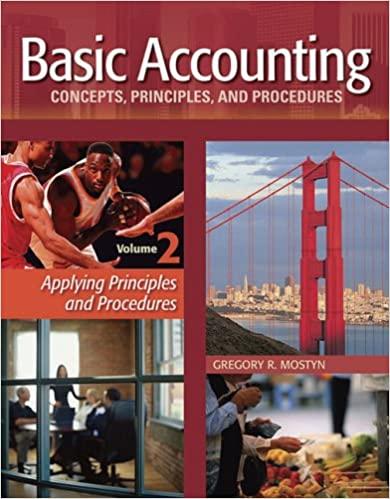Question
I sold escalators and elevators for my first job out of business school. As part of my training, before I was sent to the field,
I sold escalators and elevators for my first job out of business school. As part of my training, before I was sent to the field, I would look over the estimates made by the sales staff. This served to double-check their math so the company had confidence in their estimates. It also served to teach me many of the little nuances that more experienced estimators used. I had my training manuals, lists of standards, main methods of calculation, and so forth, but learning from others' experiences instead of making all my own mistakes helped.
One of the last parts of my training was to spend eight weeks at the Denver branch to get seasoned a little bit. Construction was booming in Denver during the late 1970s. Some days I needed to bid on more than one job. The first part of putting together a bid was to go to the office where the requests for proposals, plans, specifications, and the like wore stored. Then, armed with that information, would put together an estimate. Finally, the actual bidding took place usually over the phone. The problem was that creating a detailed estimate would generally take at least half a day. If that was my only duty lit was not), I would still have had a hard time when multiple jobs were let for bid on the same day. Something had to give.
Every morning around 10 AM, I met the construction superintendent for coffee. We would discuss each bid that was due. What other job was it like? How was it bigger or smaller than a recently completed job? What features did it include more or less than a previous job? Did we make money on that job? We used these questions to compare an upcoming job to other recently completed jobs. We would also ask, "What do we think our competition will bid? By the end of the conversation, we had determined our strategy for bidding on the job. I we won the bid, we would complete a detailed cost estimate to see if we were close.
After my training, I was transferred to Kansas City Kansas City had less construction than Denver. I had enough time to perform detailed cost estimates before I submitted bids. Therefore, we were more. certain that if we got the bid, we would have a good chance of making money.
I worked for the same company in both cities. However, we used two very different methods of estimating cost. Both made sense where they were used. In Denver, if we wanted to bid on every job (and you cannot win the job if you do not bid on it), we needed a fast method in Kansas City, we had the time to develop detailed cost estimates, and so we took the time. There are many methods of estimating project costs and each has its place.
Question 1: During training (the first job), the author reviewed project cost estimates prepared by others. Which method - analogous, parametric, bottom-up-- was used to prepare the estimates the authoring was reviewing. What evidence do you have to support your answer?
Question 2: While working in Denver, which method of estimating analogous, parametric, bottom-up -- did the author use to prepare project bids (cost estimate for the project)? Could another method be used why or why not? What evidence do you have to support your answer?
Question 3: While working in Kansas City, which method of estimating analogous, parametric, bottom-up did the author use to prepare project bids? Could another method be used why or why not? What evidence do you have to support your answer?
Step by Step Solution
There are 3 Steps involved in it
Step: 1

Get Instant Access to Expert-Tailored Solutions
See step-by-step solutions with expert insights and AI powered tools for academic success
Step: 2

Step: 3

Ace Your Homework with AI
Get the answers you need in no time with our AI-driven, step-by-step assistance
Get Started


